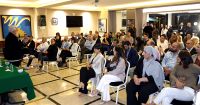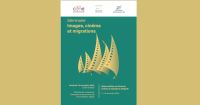The three-day event, running Friday-Sunday, was organized by the Institute for Justice and Journalism and the UA. It is aimed at journalists, activists and programmers, but everyone in the community is invited to participate.
“This is for anybody who’s interested in telling stories through hard data,” said Celeste Gonzalez de Bustamante, an associate professor at the UA School of Journalism and a Migrahack organizer. “Who could be a journalist today? It could be anybody.”
Among the news organizations fielding teams will be TucsonSentinel.com.
"There has been so much amazing work done at previous Migrahacks," said Dylan Smith, Sentinel editor and publisher. "Given the importance of border and immigration issues to Tucson, the UA is a natural place to hold this event."
"We're looking forward to seeing more great reporting work — and people should contact us if they're interested in participating on our team," Smith said.
The trainings include sessions on the Tarbell publishing platform by developer David Eads of NPR Visuals, using the U.S. Census database by Jens Manuel Krogstad of the Pew Research Center, creating interactive visualizations with Ken McBride of Interworks and many more. Unlike many “hackathons,” trainings are designed for people with various levels of programming experience, from beginning to advanced.
There will be a total of $5,000 in cash prizes, recognizing the best work, awarded on the last day of the event. Bustamante recommended wearing comfortable clothes and coming prepared to stay for the full day.
“It’s going to be an intensive experience and I think they’re going to get a lot out of it,” she said.
Migrahack started in 2012, when Claudia Nuñez, then a Knight Fellow at Stanford University, saw a need for more diversity in hackathons. Partnering with the Institute for Justice and Journalism, she developed this project, which has been held in Los Angeles, Chicago, San Francisco, Atlanta and Mexico City, with sessions attracting hundreds of reporters and coders. Nuñez is currently the Spanish-language web editor for Human Rights Watch.
The Arizona Migrahack brings this data-centered approach to looking at immigration to a state that plays a central role in what Bustamante calls an “unprecedented time in immigration.” Displaying data in new ways helps show the complexity of issues surrounding immigration.
“We’re trying to get participants away from the extreme discourse and to look at the stories and look at the data to see what is really going on,” she said.
Through the trainings and collaborative, data-driven projects, Migrahack attendees will learn to “use data in a better way,” said Bustamante. “I expect that we’re going to see amazing projects that come out of hack that reflect the complexity of migration in this region.”
The Arizona Migrahack has received support from numerous businesses and from the University of Arizona.
“We’ve received tremendous support from the university community to put this on," Bustamante said. “So many different units have come forward to help with this event, which I think is a testament to how important people thinks this is.”
Registration will be held at 8:30 a.m. on Friday — or visit http://justicejournalism.org/events/arizona-migrahack for pre-registration. The event will be held at the University of Arizona Science-Engineering Library, 744 N. Highland Ave.
Source: TucsonSentinel
![]()





